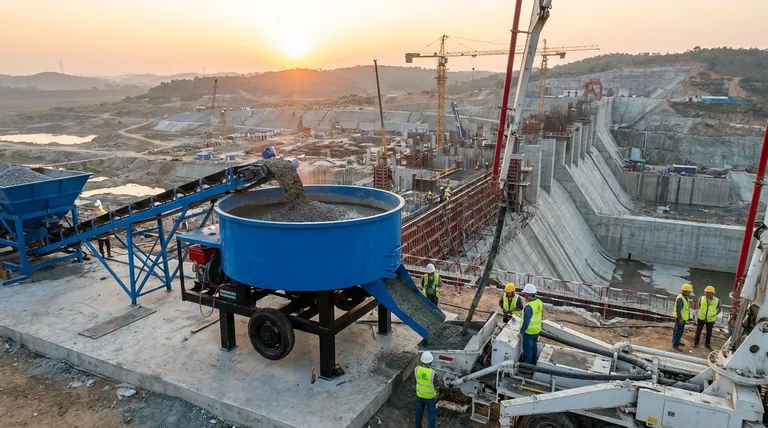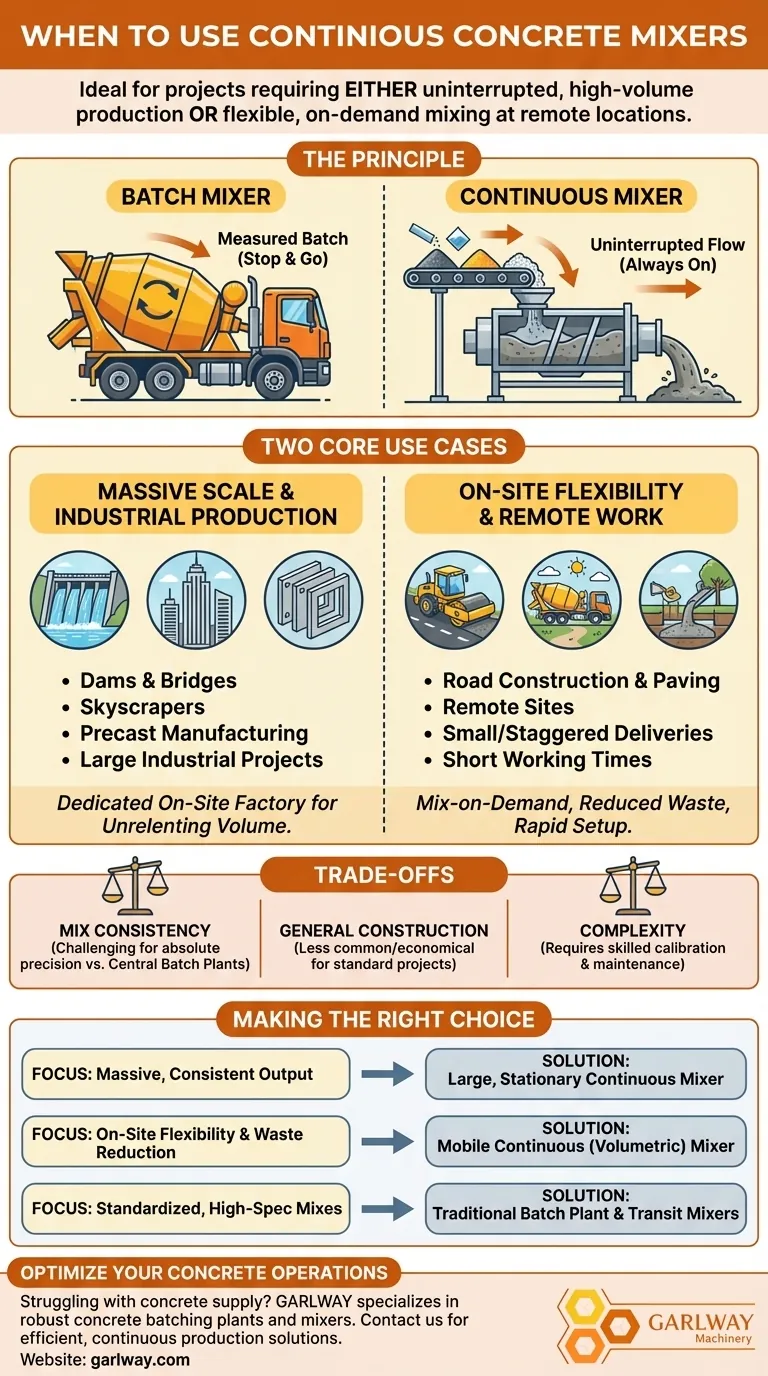In short, continuous mixers are used for projects at two distinct ends of the spectrum: massive-scale infrastructure requiring a non-stop, high-volume supply of concrete, and highly flexible applications demanding precise, on-demand mixing at remote or constrained job sites. These mixers are chosen when the flow of production is as important as the total volume.
The decision to use a continuous mixer is driven by the need for an uninterrupted production model. It excels in scenarios that mimic a factory assembly line, whether that line is building a dam or paving a remote roadway miles from a traditional plant.

The Principle of Continuous Mixing
To understand where continuous mixers are used, you must first understand how they fundamentally differ from the more common batch mixer.
How They Work
A batch mixer, like a drum mixer on a typical concrete truck, mixes one complete, measured batch at a time. In contrast, a continuous mixer constantly feeds materials like cement, sand, and aggregate using screw feeders or conveyors, mixes them, and discharges fresh concrete at a steady rate.
The Key Advantage: Uninterrupted Flow
This "always on" process provides an uninterrupted stream of concrete. This is the core reason it's chosen for specific applications where stopping and starting production is inefficient or detrimental to the project's quality.
Two Core Use Cases: Scale vs. Flexibility
The continuous model serves two primary types of projects that benefit from its uninterrupted flow.
Massive Scale and Industrial Production
For enormous infrastructure and industrial projects, a stationary continuous mixer acts like a dedicated concrete factory on-site. The goal is sheer, unrelenting volume.
Projects in this category include:
- Dams and Bridges: Require immense, consistent pours over extended periods.
- Skyscrapers: Need a reliable, high-volume source to feed concrete pumps.
- Precast Concrete Manufacturing: An assembly-line process where a constant supply of mix is essential for efficiency.
- Large Industrial Projects: Facilities that demand steady production for foundations or structures.
On-Site Flexibility and Remote Work
The other major use case involves mobile continuous mixers, often called volumetric mixers. These are trucks that carry unmixed materials to a job site and mix concrete on the spot.
This provides unparalleled flexibility for:
- Road Construction and Paving: Especially for low-slump concrete where a continuous paver needs a constant feed.
- Remote Sites: Eliminates the problem of long transit times from a batch plant, which can compromise concrete quality.
- Small or Staggered Deliveries: Perfect for projects requiring small amounts of concrete at different times, as it mixes only what is needed, dramatically reducing waste.
- Short Working Times: Allows for rapid setup and production without waiting for a transit mixer to arrive.
Understanding the Trade-offs
While powerful, continuous mixers are not the solution for every project. Their specific nature introduces important trade-offs.
The Challenge of Mix Consistency
While modern continuous mixers are highly accurate, achieving the absolute mix-design precision of a computer-controlled central batch plant can be more challenging. Batch plants excel at producing certified, high-specification mixes for a wide variety of clients.
Less Common for General Construction
For many standard construction projects, such as residential foundations or small commercial buildings, the logistics are simpler and more economical using scheduled deliveries from a central batch plant. The setup and calibration of a continuous mixer are unnecessary for these tasks.
Maintenance and Operational Complexity
The system of continuous feeders, gates, and augers has more moving parts than a simple batch drum. This requires consistent calibration and skilled maintenance to ensure the material proportions remain accurate throughout a long production run.
Making the Right Choice for Your Goal
Selecting the right mixing technology comes down to your project's specific operational needs and constraints.
- If your primary focus is massive, consistent output: A large, stationary continuous mixer is ideal for projects like dams or precast factories where you need a non-stop production line.
- If your primary focus is on-site flexibility and waste reduction: A mobile continuous (volumetric) mixer is perfect for remote sites, road repairs, or jobs with unpredictable concrete needs.
- If your primary focus is standardized, high-specification mixes for varied projects: A traditional batch plant and transit mixer system often provides the most reliable and economical solution.
Ultimately, continuous mixers are chosen when the process of concrete production is as critical to success as the final product itself.
Summary Table:
| Project Type | Key Advantage | Typical Use Cases |
|---|---|---|
| Massive Scale | Uninterrupted, high-volume production | Dams, skyscrapers, precast manufacturing |
| On-Site Flexibility | Mix-on-demand, reduced waste | Road paving, remote sites, staggered deliveries |
Struggling with concrete supply for a large-scale or remote project? GARLWAY specializes in construction machinery, offering robust and reliable concrete batching plants and mixers designed for contractors and construction companies globally. Our solutions ensure efficient, continuous production tailored to your project's specific needs. Contact GARLWAY today to discuss how we can optimize your concrete operations!
Visual Guide

Related Products
- Ready Mixer Machine for Construction Ready Mix Machinery
- Portable Concrete Mixer Machine Equipment for Mixing Concrete
- Hydraulic Concrete Mixer Machine Cement Mixing Equipment for Mixture Concrete
- Commercial Construction Mixer Machine for Soil Cement Mixing Concrete
- Portable Ready Mix Concrete Mixer Equipment
People Also Ask
- What safety considerations are important for concrete mixer operation? A Guide to Proactive Risk Management
- What should be considered regarding the output of a concrete mixer? Match Capacity to Your Project Scale
- When was the first concrete mixer developed and by whom? Discover the 1900 Breakthrough
- Why is the manufacturer's strength and service important when choosing a concrete mixer? Ensure Long-Term Project Success
- What is the function of a concrete mixer machine? Achieve Consistent, High-Quality Concrete for Your Projects


















